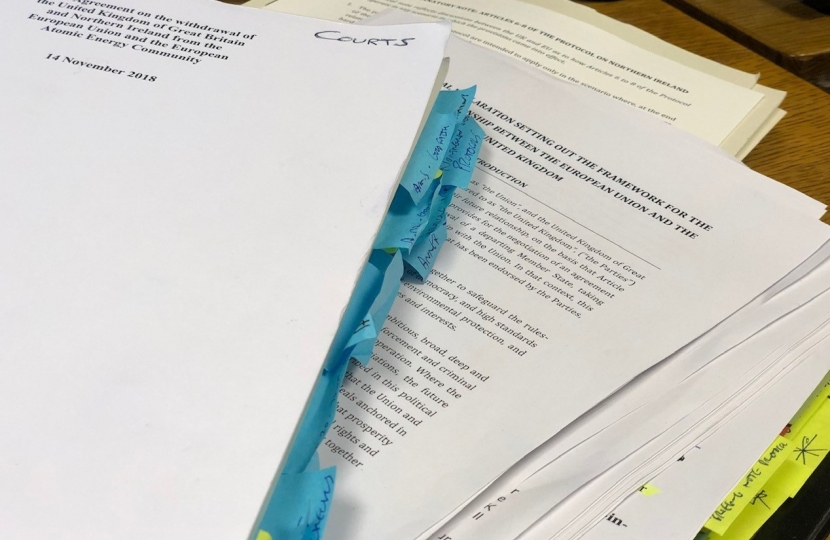
I have twice voted against the Prime Minister’s Withdrawal Agreement on the basis that it is a bad deal.
Like the Withdrawal Agreement, my views have not changed. I still believe it to be flawed and fraught with risk. To say that I am disappointed that this is the deal that lays before me after two years of negotiations is an understatement. I do not unsay anything that I have said about it.
But what has fundamentally changed is the context and circumstances: this same deal now appears to be the only mechanism available to us to leave the European Union, which is what the country voted for in 2016, before I was an MP, in the largest democratic exercise in our nation’s history.
I am very mindful of the promises I made to my constituents during the General Election in 2017. Whether you voted to leave or to remain, I have to remember at all times that I was elected on a manifesto that had as its first and foremost commitment to leave the EU and, whilst I am conscious of the controversy inherent in this, the fact remains that my mandate and contract with the people of West Oxfordshire is to honour that pledge.
On a personal level, I have always favoured leaving the EU with an orderly, compromise deal - one that enables a close trading and co-operative relationship with the EU, but which removes us from its political, integrationist ambitions, whilst preserving and enhancing democratic accountability. I believe we need to build an enduring new settlement with the EU that reflects the concerns of both sides insofar as is possible, and to that end have campaigned for a broad and comprehensive free trade agreement with the EU (often called ‘Canada+’) as in my view – and the view of most moderate Conservatives – this provides the best compromise between securing market access and close co-operation, whilst retaining national sovereignty and democratic accountability.
Most recently I have enthusiastically supported the Malthouse A & B proposals which sought to bring Remainers and Leavers together behind a revised Withdrawal Agreement.
I have also been willing to look at other compromise solutions, such as UK membership of the EEA through the EFTA pillar – and still believe this to be worthy of consideration in the second phase of talks, which can only be entered into upon the passage of a Withdrawal Agreement.
But none of these proposals have been embraced at this stage – though there is a chance that some can be in the second phase of talks when we move on to discuss our future relationship with the EU. I believe this is now where our focus ought to be.
Some of you will say to me that I ought to vote against the Withdrawal Agreement again because you believe it means we can leave on WTO terms. I have never believed in the apocalyptic predictions associated with the prospect of our leaving with no-deal, but the simple fact is – whether you like it or not - that it simply will not happen. To believe no-deal is still a realistic option is to drastically underestimate the lengths to which unreconciled Remainers in Parliament (of which there are a majority) – aided by the somewhat partial Speaker of the House of Commons (who has been willing to upend the constitution) – will go to prevent this outcome. President Lyndon Johnson’s first rule of politics was that “[its] practitioners need to be able to count.” The hard reality is that the numbers for a WTO Brexit simply aren’t there, and a majority of MPs will do everything they can – including upending our constitution - to prevent it.
Further, the PM has been clear that she will not even consider a no-deal exit which – even if you do not desire this as an outcome – was always essential for a sound negotiating platform. Those two factors have fundamentally changed the nature of the decision I now have to take.
Some of you might also say that a long delay to Brexit is preferable to agreeing this deal. I do not believe this to be so. A long delay would simply pass control of this process over to Parliament. Parliament would almost certainly seize this opportunity to pursue a permanent customs union with the EU (the worst possible future relationship), or try to force a second referendum – perhaps even revoking Article 50 in the process.
Furthermore, individuals and businesses alike are clamouring for certainty and for us to break the impasse to move on to the next phase of talks.
I then find myself faced with two remaining outcomes: voting for the Prime Minister’s deal, or having no Brexit at all. The latter of these I am unable to support because it would be contrary to my central manifesto pledge, and for the irreparable damage that would be done to our democracy and social fabric.
You might say to me that this deal is worse than staying in the European Union. But I disagree with this point of view: this deal is unquestionably better than staying in the European Union. We will be legally free from the EU’s treaties and out of the relentless momentum for political integration. The slogan of the successful Vote Leave campaign was “take back control of our money, borders and laws”. This deal delivers on the first two points in full and, with improved statesmanship in the next phase of talks, can deliver on all these points. It is for this reason that the Chief Executive of the Vote Leave campaign has expressed his support for the deal.
I cannot camouflage the disappointment I feel about the way in which these negotiations have been handled – which I became deeply concerned at last summer, leading me to resign from my Government post in the hope of forcing a change of course. Sadly, despite my best efforts, we failed to change tack and the result is the Withdrawal Agreement we have today.
But despite its weakness, I will vote for it if/when it is brought back before Parliament because I believe the alternatives are far worse. I reiterate that I do not take back a word I have said against this deal, but profoundly believe that we need now to take this opportunity to secure our withdrawal from the EU, put to bed all talk of second referendums and long Article 50 extensions, and begin the process of negotiating a future relationship with the EU.
With a renewed sense of vision and ambition, I believe we can still overcome the deficiencies of the Withdrawal Agreement and achieve the ultimate prize in the second phase of talks and it is on that which we must now focus.
This is the most difficult decision I have ever wrestled with during my time in Parliament and will probably never be surpassed. I realise it will not please everyone, but I am ultimately elected to weigh up the legal and political implications of each possible outcome and exercise my judgement as to what is our country’s, and West Oxfordshire’s, best interests.
It is with great reluctance that I have come to the view that the best thing to do is to vote for the Withdrawal Agreement, secure our exit from the EU, and put all of our efforts into ensuring a sub-optimal withdrawal leads to an optimal permanent relationship – and that we ultimately come together to build a country that is more confident, democratic and free.
Robert Courts MP

